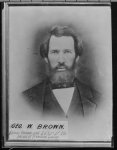Parts 1 and 2; Squatter Sovereign article
Once a new Kansas Legionnaire swore that he would not reveal what he saw in the Legion’s meetings, his regiment’s Aid would pass him on to the Colonel for instructions. These instructions began with some flattery:
Sir, it is with joy we welcome you to this place, to these scenes and to this sacred alliance. We trust you will find in us that purity of purpose, and we will find in you such nobleness and truth, that this union may result in constantly increasing regard, confidence, and love between us. This country is yours by adoption, and as belonging to you and your children, you feel a deep interest in its prosperity, its honor, and its destiny.
But one had just petitioned to join a secret antislavery paramilitary group. If the postulant missed the significance of this, the Colonel went on to narrate the plight of an antislavery man in Kansas
where slavery intends making its next innovation; already we have had a foretaste of its contaminating touch, and knowing that strength lies in union-feeling that our country and our God demands of us in this emergency that every man should do his duty
The Quartermaster’s oath of secrecy insisted nothing learned would put a burden on a man’s conscience or come between him and his god. The Colonel’s speech suggests that failure to join would accomplish the latter. A good, Christian man had a duty to his god. The Legion would inform him of it, if necessary, and guide him in accomplishing it. This entailed that he throw together with other antislavery men, forging “solemn bonds” through which they would learn their “strength” and “act in concert throughout this whole Territory.”
This all bent toward the end of a free Kansas, of course, but the Colonel impressed upon the postulant that matters political and matters personal came together. The Legion would work to free Kansas, but also to
exert an influence, possess an efficiency, and enjoy personal and civil protection, which as mere individuals we could not obtain.
Here we find reference to personal danger, just as George Brown had described. That Kansas did not erupt in quite the advertised level of bloodshed did not make it entirely safe. Back in April, when the founders of the Legion set down the constitution and ritual, no white men had yet died. But they had the threats and violence, however non-lethal, that had attended the March polls to consider. If men could burst into a polling place and demand the election judges give over at gunpoint, then they could do more in the future.
Brown and others may have exaggerated the danger, but the extent of his fear came out in a private letter that he did not appreciate seeing published. If he had reason to exaggerate for the public, he had less reason to do so in personal correspondence. I don’t have that letter, but Brown admitted writing it and, at least by implication, that it encouraged someone not to come to Kansas. This runs against the grain of his publications and contrary to his political interests, so we should take it as less burdened by a desire to keep up appearances and more indicative of his honest beliefs at the time of writing.
Furthermore, we should keep in mind that even if Brown and others knew they exaggerated proslavery violence then did not know, as we do, just how far the proslavery men would and would not go. What appear exaggerations to us might have seemed to them quite reasonable projections of the way Kansas would progress even if they fell short of perfectly accurate reporting.
With all these things to consider, the Colonel then offered up a second oath. The first only promised secrecy enough for a man to learn what the Kansas Legion entailed. It took another to make him into a proper member. More on that Tuesday.


You must be logged in to post a comment.